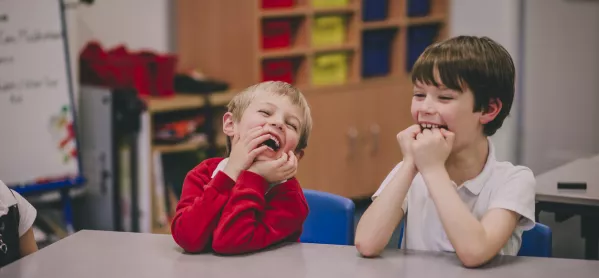Helping children to make and maintain friendships is a crucial part of a teacher’s skill. Sometimes we forget how crucial it is. We get consumed by timetables, the national curriculum and the amount we need to teach, and forget that friendships form the backbone of a well-run classroom and are vital to a child’s wellbeing.
Pupil wellbeing: Three ways to teach optimism
Research: Want happier pupils? Make your classroom ‘tribal’
Opinion: ‘Happy pupils perform better in school and in life’
Attributes such as social competence, self-esteem and self-confidence are all linked to a child’s ability to make friends. But do we do enough to teach children about friendships and the ability to maintain them?
Happiness
Watch any Reception class, or any playground, and you will see that, for some children, this skill of making friends is easily achieved, but for others it seems beyond them. The skill set needed to make friends and keep them is extremely complicated, and we do very little to help children to understand it.
Friendship and happiness are correlated, and research shows happy learners learn best. We can also appreciate that children with a strong friendship group have a greater sense of wellbeing with fewer social problems. All attributes that are necessary for a successful adulthood.
So, as teachers, can we teach friendship, and can we teach children how to behave in a friendship in order to maintain it?
Successful friendships
We can all appreciate that this is difficult, but we can lay the foundations for successful friendships in our classroom by:
- Teaching the interpersonal skills needed. We can allow children of all ages to express their opinions in a constructive way, and allow difference to be respected. This will develop their empathy for the feelings of others.
- Providing the time, space and opportunities in every area of the curriculum to engage in play and discussion within continually changing groups.
- Recognising the peer culture both inside the classroom and in the playground, and developing the strategies to influence change in these groups if necessary.
- Creating a safe space and opportunities to discuss friendship issues, if needed.
- Using role play to allow social skills to be taught in a non-threatening way, and doing the same for resolving conflicts.
- Recognising that happiness is contagious. A happy teacher creates happy children.
In adulthood, we value - and often treasure - the friendships we have made. Perhaps we just need to do a little more to teach children how to achieve similar friendships.
Colin Harris led a school in a deprived area of Portsmouth for more than two decades. His last two Ofsted reports were “outstanding” across all categories





